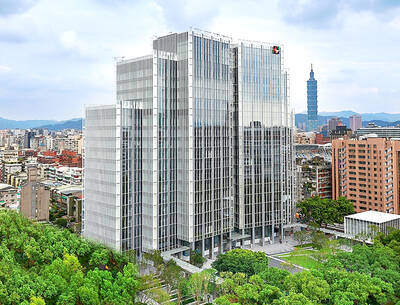Debt-ridden computer memory chipmaker ProMOS Technologies Inc (茂德科技) said yesterday it was seeking an additional NT$5 billion (US$148 million) in syndicated loans from local banks to pay debts due next week.
The capital injection could help the Hsinchu-based company solve pressing financial problems. ProMOS must repay roughly US$330 million in corporate bonds due on Feb. 14. The bondholders can exercise a put option to sell the bonds back to the chipmaker by maturity date.
“This is part of our greater efforts to raise funds to repay the corporate bonds,” company spokesman Ben Tseng (曾邦助) said by telephone.
ProMOS will provide manufacturing equipment worth more than NT$10 billion and guarantors as collateral for the loans, Tseng said, confirming a report by the Chinese-language Commercial Times yesterday.
Tseng declined to reveal the names of the guarantors, but Minister of Economic Affairs Yiin Chii-ming (尹啟銘) told a press conference yesterday that two companies had agreed to guarantee the full sum of NT$5 billion.
One of the companies is a chip packaging and testing firm headquartered in the US, Yiin said without elaborating.
The newspaper said ProMOS would secure NT$5 billion in short-term syndicated loans from the Bank of Taiwan and seven other local banks and that ProMOS would be required to repay them within a year based on an initial agreement reached at a second round of talks.
ProMOS said the report was partly speculation.
Tseng declined to comment on whether ProMOS would secure new capital from any other sources to pay its debts.
The chipmaker raised NT$3.39 billion by selling equipment and real estate in December and last month, it said in filings to the Taiwan Stock Exchange.
ProMOS shares jumped 6.83 percent to close at NT$1.72 yesterday.
Shares of local rivals Powerchip Semiconductor Corp (力晶半導體) and Nanya Technology Corp (南亞科技) rose for the second straight trading day by 6.71 percent and 6.16 percent to NT$3.5 and NT$6.38 respectively.

UNCERTAINTY: Investors remain worried that trade negotiations with Washington could go poorly, given Trump’s inconsistency on tariffs in his second term, experts said The consumer confidence index this month fell for a ninth consecutive month to its lowest level in 13 months, as global trade uncertainties and tariff risks cloud Taiwan’s economic outlook, a survey released yesterday by National Central University found. The biggest decline came from the timing for stock investments, which plunged 11.82 points to 26.82, underscoring bleak investor confidence, it said. “Although the TAIEX reclaimed the 21,000-point mark after the US and China agreed to bury the hatchet for 90 days, investors remain worried that the situation would turn sour later,” said Dachrahn Wu (吳大任), director of the university’s Research Center for

Alchip Technologies Ltd (世芯), an application-specific integrated circuit (ASIC) designer specializing in artificial-intelligence (AI) chips, yesterday said that small-volume production of 3-nanometer (nm) chips for a key customer is on track to start by the end of this year, dismissing speculation about delays in producing advanced chips. As Alchip is transitioning from 7-nanometer and 5-nanometer process technology to 3 nanometers, investors and shareholders have been closely monitoring whether the company is navigating through such transition smoothly. “We are proceeding well in [building] this generation [of chips]. It appears to me that no revision will be required. We have achieved success in designing

PROJECTION: KGI Financial said that based on its foreign exchange exposure, a NT$0.1 increase in the New Taiwan dollar would negatively impact it by about NT$1.7 billion KGI Financial Holding Co (凱基金控) yesterday said its life insurance arm has increased hedging and adopted other moves to curb the impact of the local currency’s appreciation on its profitability. “It is difficult to accurately depict the hedging costs, which might vary from 7 percent to 40 percent in a single day,” KGI Life Insurance Co (凱基人壽) told an investors’ conference in Taipei. KGI Life, which underpinned 66 percent of the group’s total net income last year, has elevated hedging to 55 to 60 percent, while using a basket of currencies to manage currency volatility, the insurer said. As different

Taiwanese insurers are facing difficult questions about the damage of recent swings in the New Taiwan dollar. Regulators might have a partial solution: letting firms change how they calculate the value of foreign currency assets. The Financial Supervisory Commission (FSC) is considering allowing insurers to use six-month average exchange rates when they calculate risk-based capital in their semiannual reports, a shift from the current system where insurers use exchange rates on the final day of reporting. The change could ease pressure on the US$1.2 trillion insurance sector, whose huge exposure to foreign assets came into the spotlight earlier this month after a